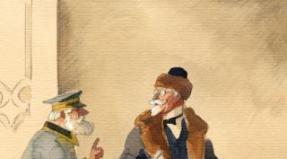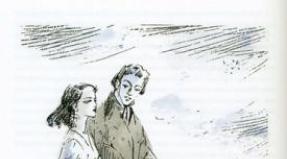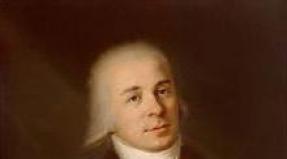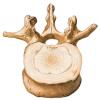What Derzhavin wrote. Derzhavin Gavriil Romanovich: short biography, photo, creativity, facts from life. The golden snuffbox from the hands of the empress
Gavrila Romanovich Derzhavin (1743-1816) - an outstanding Russian poet of the 18th - early 19th centuries. Derzhavin's work was innovative in many ways and left a significant mark in the history of the literature of our country, influencing its further development.
The life and work of Derzhavin
Reading the biography of Derzhavin, it can be noted that the early years of the writer did not indicate in any way that he was destined to become a great man and a brilliant innovator.
Gavrila Romanovich was born in 1743 in the Kazan province. The family of the future writer was very poor, but belonged to the nobility.
Young years
As a child, Derzhavin had to endure the death of his father, which further worsened the financial situation of the family. The mother was forced to go to great lengths to provide for her two sons and give them at least some kind of upbringing and education. There were not so many good teachers in the provinces where the family lived; they had to put up with those who could be hired. Despite the difficult situation, poor health, unskilled teachers, Derzhavin, thanks to his abilities and perseverance, was still able to get a decent education.
Military service

While still a student of the Kazan gymnasium, the poet wrote his first poems. However, he did not manage to finish his studies at the gymnasium. The fact is that a clerical mistake made by some employee led to the fact that the young man was sent to military service in St. Petersburg a year earlier, in the position of an ordinary soldier. Only ten years later, he still managed to achieve the rank of officer.
With his entry into military service, Derzhavin's life and work changed greatly. The duty of service left little time for literary activity, but despite this, during the war years Derzhavin composed quite a few comic poems, and also studied the works of various authors, including Lomonosov, whom he especially revered and considered a role model. German poetry also attracted Derzhavin. He knew German perfectly and was engaged in translations into Russian of German poets and in his own poems often relied on them.
However, at that time Gavrila Romanovich did not yet see his main vocation in poetry. He aspired to a military career, to serve his homeland and improve the financial situation of his family.
In 1773-1774. Derzhavin took part in suppressing the uprising of Yemelyan Pugachev, however, he did not achieve an increase and recognition of his merits. Having received only three hundred souls as a reward, he was demobilized. For some time, circumstances forced him to earn a living in a not entirely honest way - by playing cards.
Disclosure of talent
It is worth noting that it was at this time, by the seventies, that his talent was first revealed for the first time. "Chatalagai Odes" (1776) aroused the interest of readers, although in a creative sense this and other works of the seventies were not yet completely independent. Derzhavin's work was somewhat imitative, in particular Sumarokov, Lomonosov and others. The strict rules of versification, which, following the classicist tradition, obeyed his poems, did not allow the author's unique talent to be fully revealed.
In 1778, a joyful event happened in the writer's personal life - he fell passionately in love and married Ekaterina Yakovlevna Bastidon, who for many years became his poetic muse (under the name of Plenira).
Own path in literature

Since 1779, the writer has chosen his own path in literature. Until 1791, he worked in the genre of the ode that brought him the greatest fame. However, the poet does not simply follow the classicist examples of this austere genre. He reforms it, completely changing the language, which becomes unusually sonorous, emotional, not at all the same as it was in measured, rational classicism. Derzhavin completely changed the ideological content of the ode. If earlier state interests were above all, now personal, intimate revelations are also introduced into Derzhavin's work. In this respect, he foreshadowed sentimentalism with its emphasis on emotionality, sensuality.
Last years
In the last decades of his life, Derzhavin stopped writing odes, love lyrics, friendly messages, and comic poems began to prevail in his work.
Derzhavin's work in brief
The poet himself considered his main merit to introduce into fiction a "funny Russian style", in which elements of a high and vernacular style were mixed, lyrics and satire were combined. Derzhavin's innovation was also in the fact that he expanded the list of themes of Russian poetry, including plots and motifs from everyday life.
Solemn odes
Derzhavin's work is briefly characterized by his most famous odes. They often coexist with everyday and heroic, civic and personal principles. Derzhavin's work thus unites previously incompatible elements. For example, "Poems for the Birth of a Porphyry Child in the North" can no longer be called a solemn ode in the classicist sense of the word. The birth of Alexander Pavlovich in 1779 was described as a great event, all geniuses bring him various gifts - reason, wealth, beauty, etc. However, the wish of the last of them ("Be a man on the throne") indicates that the king is a man, which was not typical for classicism. Innovation in Derzhavin's work manifested itself here in a mixture of civil and personal status of a person.
"Felitsa"

In this ode Derzhavin dared to address the empress herself and polemicize with her. Felitsa is Catherine II. Gavrila Romanovich presents the reigning person as something that violates the strict classicist tradition that existed at that time. The poet admires Catherine II not as a statesman, but as a wise person who knows his own path in life and follows it. Then the poet describes his life. Self-irony, when describing the passions that possessed the poet, serves to emphasize the merits of Felitsa.
"On the capture of Ishmael"
This ode depicts the majestic image of the Russian people conquering a Turkish fortress. Its strength is likened to the forces of nature: an earthquake, a sea storm, a volcanic eruption. However, she is not spontaneous, but obeys the will of the Russian sovereign, driven by a sense of devotion to the motherland. The extraordinary strength of the Russian soldier and the Russian people in general, his might and greatness were depicted in this work.

"Waterfall"
In this ode, written in 1791, the image of a stream, symbolizing the frailty of life, earthly glory and human greatness, becomes mainly. The prototype of the waterfall was Kivach, located in Karelia. The color palette of the work is rich in various shades and colors. Initially, it was just a description of the waterfall, but after the death of Prince Potemkin (who died unexpectedly on the way home, returning with a victory in the Russian-Turkish war), Gavrila Romanovich added a semantic content to the picture, and the waterfall began to personify the frailty of life and lead to philosophical reflections on various values. Derzhavin was personally acquainted with Prince Potemkin and could not help but respond to his sudden death.
However, Gavrila Romanovich was far from admiration for Potemkin. In the ode, Rumyantsev is opposed to him - this is who, according to the author, the true hero. Rumyantsev was a true patriot, caring about the common good, not personal fame and welfare. A quiet stream figuratively corresponds to this hero in the ode. The noisy waterfall is contrasted with the nondescript beauty of the Suna River with its majestic and calm flow, clear waters. People like Rumyantsev, living their lives calmly, without fuss and boiling passions, can reflect all the beauty of the sky.

Philosophical odes
The themes of Derzhavin's work continue the philosophical "On the Death of Prince Meshchersky" (1779) was written after the death of the heir to Paul. Moreover, death is depicted figuratively, it "sharpens the blade of the scythe" and "gnashes its teeth." Reading this ode, at first it even seems that this is a kind of "hymn" to death. However, it ends with the opposite conclusion - Derzhavin encourages us to value life as an "instant gift from heaven" and live it so as to die with a pure heart.
Anacreontic lyrics
Imitating the ancient authors, creating translations of their poems, Derzhavin created his miniatures, in which the national Russian flavor, everyday life is felt, and Russian nature is described. Classicism in the work of Derzhavin also underwent its transformation here.
Anacreon's translation for Gavrila Romanovich is an opportunity to go into the kingdom of nature, man and life, which had no place in strict classicist poetry. Derzhavin was very attracted to the image of this ancient poet, who despises light and loves life.
In 1804, Anacreontic Songs were published as a separate edition. In the preface, he explains why he decided to write "light poetry": the poet wrote such poems in his youth, but published now because he left the service, became a private person and is now free to publish whatever he wants.
Late lyrics

One of the features of Derzhavin's work in the late period is that at this time he practically ceases to write odes and creates mainly lyrical works. The poem "Eugene. Zvanskaya Life", written in 1807, describes the everyday domestic life of an old nobleman living in a luxurious rural family estate. Researchers note that this work was written in response to Zhukovsky's elegy "Evening" and was polemic to the emerging romanticism.
Derzhavin's late lyrics also include the work "Monument", filled with faith in the dignity of man despite adversity, life's ups and downs and historical changes.
The significance of Derzhavin's work was very great. The transformation of classicistic forms, begun by Gavrila Sergeevich, was continued by Pushkin, and later by other Russian poets.
Derzhavin Gavriil Romanovich, whose biography formed the basis of this article, forever entered Russian history not only as an outstanding poet and playwright, but also as a statesman, who went from a private guard to the head of the Ministry of Justice. Having exerted a tremendous influence on the further development of Russian literature, he became at the same time a model of a true citizen and patriot.
Childhood of a young poet
Gavriil Romanovich Derzhavin was born on July 14, 1743 in the ancestral village of Sokury near Kazan. The family had many children, and due to the early death of its head - Roman Nikolaevich - the mother of the future poet - Fyokla Andreevna - could not give the children a proper education. Frequent travels caused by various everyday circumstances also hindered this.
Nevertheless, while studying at the Orenburg school, and then at the Kazan gymnasium, young Gavriil Derzhavin early became addicted to classical Russian poetry, the highest examples of which at that time were the poems of M. Lomonosov, V. Trediakovsky and A. Sumarokov. His first own poetic experiments date back to this time. However, the early poems of the beginning poet came out somewhat clumsily and awkwardly - the lack of knowledge of the basics of versification and the opportunity to consult with someone more experienced in this area affected.
Army service
In 1762, Gabriel Derzhavin was assigned as a private in the Preobrazhensky Guards Regiment, which took part in a coup d'état, which resulted in the accession to the throne of Empress Catherine II. The years spent in the army, according to the poet's own admission, were the most bleak period of his life. Heavy soldier's service took up almost all the time and effort, allowing you to write poetry only in rare free moments.
Subsequently, Gabriel Derzhavin, briefly describing in his memoirs the features of army life, said that in those years he was often attached to the common vice of the guards regiments - playing cards. Moreover, finding himself in an environment where cheating flourished, he quickly learned their roguish tricks, and only thanks to "God and motherly prayers" - this is how he wrote in his memoirs, did not slip to the bottom of society.

On the eve of a future career
Beginning in 1772, the further biography of Gabriel Derzhavin took a different direction: he was promoted to an officer, and in the period from 1773 to 1775 he took part in the work of the state commission investigating the circumstances of the Pugachev revolt.
Experiencing severe material difficulties, Gabriel Romanovich turned to the empress herself for help, since in those days the autocrats did not hesitate to read the letters of their subjects. His direct superior, the commander-in-chief of the troops, General-in-Chief A. Bibikov, attached his own report to the message, in which he highly appreciated Derzhavin's merits in "establishing obedience to the law among Kalmyks." As a result, very soon the young man was awarded the rank of collegiate counselor and became the owner of 300 serf souls, bestowed upon him by the empress personally.
First marriage and the acquisition of creative maturity
In the same 1775, another important and joyful event took place in the life of Gabriel Derzhavin - he got married. His wife was the sixteen-year-old girl Catherine Bastidon, whose father was once the valet of the murdered Tsar Peter III, and her mother was the nurse of the future Emperor Paul I. ".
Most researchers of the poet's work consider these years to be the period of his acquisition of his own literary style, which made it possible to create a cycle of outstanding works in the genre of philosophical lyrics. At the same time, his works began to be published for the first time, but did not bring the author wide popularity in literary circles.

The golden snuffbox from the hands of the empress
Glory came to Derzhavin only after writing the ode "Felitsa", dedicated to Empress Catherine II. In this work, full of the most loyal feelings, the author presented the Russian autocrat as the ideal of an enlightened ruler and mother of nations.
Such obvious flattery, clothed in a highly artistic form, did not remain without due reward. The "Mother of Nations" presented the poet with a golden snuff-box, strewn with diamonds and filled with chervonets, after which Gabriel Romanovich's career went uphill. Appointments to various high positions followed one after another, however, the peculiarities of Derzhavin's character prevented him from getting along with other officials and served as the reason for frequent transfers from place to place.
At the head of the Olonets region
In 1776, the previously created Olonets province was transformed into a viceroyalty, and by a decree of the Empress Gabriel Derzhavin was appointed her first governor. Among other things, his responsibilities included monitoring the observance of the rule of law by all officials subordinate to him. This turned out to be the cause of many troubles that soon followed.
In those early years, embezzlers were not yet called corrupt, but this did not diminish them. Theft was widespread, and the expression "to take by rank" even entered into use. This meant that petty bureaucrats could "bite" with impunity only a fraction of what they had access to. Mid-level officials were tacitly allowed to profit in a much larger volume, but all, “by a greedy crowd, standing at the throne,” as M.Yu. Lermontov, - they ran their hand into the treasury to the very elbow with impunity.

It is with these iniquities that once happened in Russia, and Gabriel Romanovich faced in his new post. Being a decent and law-abiding man, he tried to fight the evil surrounding him to the best of his ability, but as a result he only made numerous ill-wishers both in the structures under his jurisdiction and in court circles, which was the reason for his subsequent resignation.
Nevertheless, over the years spent as governor, and having a residence, first in Petrozavodsk, and then in Tambov, Gavriil Romanovich Derzhavin managed to do a lot of good deeds before his resignation. So, through his work, the first Tambov theater was opened, a city school was built, a hospital for the poor opened its doors and a printing house began to work.
Cabinet Secretary of the Empress
The next step on the career ladder of Gabriel Derzhavin was the service as the personal cabinet-secretary of Catherine II. Leaving aside the slander that fell on the poet from all sides, the Empress brought him closer to her as a token of gratitude for the ode written in her honor.
But Gavriil Romanovich could not resist in this position for a long time, because he used to report on all cases, presenting them in a true, and sometimes unsightly, light, which greatly upset his benefactress. He bothered her with constant intercessions for those in need and suffering from injustice. In the end, the empress got tired of him, and she sent him out of sight - transferred to the Senate.

Creator of the first Russian anthem
While in this honorary exile, Derzhavin created his most famous work. In 1791, inspired by the news of the capture of the Turkish fortress Izmail by the Russian troops under the command of AV Suvorov, he wrote the poem "Thunder of Victory, Thunder." Set to music by the composer Osip Kozlovsky, over the next years it was the official anthem of Russia, which was replaced only in 1833 by the famous "God Save the Tsar", written by another outstanding Russian poet, V. Zhukovsky, in collaboration with the composer A. Lvov.
Remarriage
In 1794, the wife of Gabriel Romanovich died - a muse whom he once glorified in poetry, giving her the romantic name of Plenira. After a year, the still far from old widower remarried. He joined his fate with Daria Alekseevna Dyakova, who also became the heroine of his poems, this time under the name of Milena.
Both marriages of the famous poet, although filled with love, turned out to be childless. Not having their own offspring, the couple raised the children of the deceased family friend P. Lazarev. One of them - Mikhail - later became a famous admiral, discoverer and explorer of the Arctic.
Career peak
During the reign of Paul I, Derzhavin served as president of the Commerce Collegium and state treasurer, and Alexander I, who ascended the throne after that, appointed him minister of justice. But wherever he served, Gavriil Romanovich tried with all his might to eradicate bribery and embezzlement, which invariably made enemies for himself. In 1803, he applied for the highest name and ended his state activities, devoting himself entirely to literature.

Subsequent life and work of the poet
Even before his resignation, Gavriil Romanovich Derzhavin loved Zvanka, an estate that belonged to his second wife Daria Alekseevna. In it he spent the last years of his life, writing about 60 poems and preparing the first volume of his works for publication. In addition to poetry, works in the field of drama are associated with his name. These include librettos for several operas, as well as the tragedies Herod and Marianne, Eupraxia and The Dark.
Derzhavin's poetry had a tremendous influence on the early work of A.S. Pushkin, who from childhood read his poems and studied them at the Lyceum in the lessons of Russian literature. They had a chance to see each other only once. In 1815 Derzhavin was invited to the lyceum exam, where a very young Alexander Pushkin read in his presence his famous poem "Memories of Tsarskoe Selo". A reproduction of a painting by I.E.Repin, reproducing this episode, is presented in the article. The venerable master, seeing his brilliant successor in the swarthy youth and deeply moved by his poetry, wanted to hug Pushkin, but he fled, being unable to restrain his sobs.
The death of the poet and the subsequent fate of his remains
Death overtook him in 1816 in the Zvanka estate, which, as mentioned above, Gavriil Romanovich Derzhavin loved before retirement, often visited, and in which he spent the rest of his life. His ashes, transported along the Volkhov to Veliky Novgorod, were buried in the Transfiguration Cathedral, located on the territory of the Varlaam-Khutynsky monastery. Later, his second wife, Daria Alekseevna, was also buried there.

During the Great Patriotic War, the monastery found itself in a combat zone and was completely destroyed. The Derzhavins' grave was also badly damaged. In 1959, their remains were reburied, placed in Novgorodsky Detinets, and in 1993, when the 250th anniversary of the poet was celebrated, they were returned to the Varlaam-Khutynsky monastery, which had been revived by that time.
Among the names of outstanding Russian poets who brought glory to Russian literature, Gabriel Derzhavin is invariably mentioned, a brief biography of which was presented in this article. The study of his life and work is of great importance not only from the aesthetic side, but also from the educational side, since the truths that he preached are eternal.
Introduction
Gabriel Romanovich Derzhavin is a famous Russian poet and statesman. A man who left a big mark on the history of Russia.
This topic is interesting because most people know his biography superficially, and even less about his creative path and political activity. My interest in G.R. Derzhavin is due to the fact that in my city - Tambov, there are many references to him. In my work, I would like to talk about his life, work, achievements and awards.
The main tasks of my work include:
1. Find out the biography of G.R. Derzhavin;
2. Learn about his creative path;
3. Learn about the activities of G.R. Derzhavin as governor;
4. Learn about the achievements of G.R. Derzhavin.
Such literary scholars as Alexander Vasilievich Zapadov and Georgy Panteleimonovich Makogonenko studied the work of Gavriil Romanovich.
The theoretical significance of my work consists in the systematization of knowledge about Gavril Romanovich Derzhavin, and the practical significance is determined by the fact that as a result, the most important stages of the life of Gavriil Romanovich will be described.
Biography of G.R. Derzhavin
Gavriil Romanovich Derzhavin was born on July 3 (14), 1743 in the village of Karmachi (according to other sources, Sokura), Kazan province. Parents - Roman Nikolaevich and Fyokla Andreevna - were not wealthy nobles. His father served in small ranks in distant garrisons - now near Kazan, now in Orenburg. The Derzhavins lived poorly and could not hire a teacher for their son; according to this literacy, the boy was taught by the sexton of the village church, then the German Rose, who was exiled to Orenburg; my father's colleagues taught mathematics. Father died when Derzhavin was eleven years old.
Since 1759, the mother managed to place her son in a gymnasium in Kazan, and Gavrila Derzhavin began to receive a systematic education. He studied diligently, showing aptitude for drawing, music and poetry. Once he was given a drawing of views of the city of Kazan, and the director of the gymnasium took these drawings to Petersburg, showed the curator of Moscow University I.I. Shuvalov. As a reward, Derzhavin was enrolled in the guard, which included the children of aristocrats and wealthy nobles. They were enrolled in the regiment, but did not serve for a long time, getting promoted in ranks.
In 1773 he took part in the suppression of the Pugachev uprising. Here Derzhavin shows himself to be a brave officer, but his inability to please his superiors led to the fact that he was bypassed with awards. Attempts to achieve a well-deserved award ended with dismissal to the civil service with the rank of collegiate counselor.
In early 1778, Gavriil Romanovich married 16-year-old Ekaterina Yakovlevna Bastidon, daughter of the former valet of Peter III.
After the publication of the ode "Felitsa", dedicated to Empress Catherine II, Derzhavin became widely known. Derzhavin was a member of the Imperial Russian Academy and took part in the creation of the first explanatory dictionary of the Russian language.
In May 1784 he was appointed the first governor of the Olonets province.
Arriving in Petrozavodsk, he organized the formation of provincial administrative, judicial and financial institutions, put into operation the first city hospital in the province.
In 1786 Derzhavin was appointed governor in Tambov. He does a lot to educate the Tambov region. During the years that he spent in the governorship, his poetic fame increased.
In 1794, the wife of Gabriel Romanovich, Ekaterina Yakovlevna, died. Six months later, he married Daria Alekseevna Dyakova.
On October 7, 1809, he was dismissed and relieved of all government posts. In retirement he settled in his estate Zvanka in the Novgorod province and was engaged in literary activities.
Gavriil Romanovich Derzhavin died in 1816, and his wife Daria Alekseevna in 1842. They were buried in the Transfiguration Cathedral of the Varlaamo-Khutynsky monastery. During the Great Patriotic War, the monastery buildings came under artillery fire and were in ruins for more than forty years. In 1959, the remains of G.R. Derzhavin and his wives were reburied in the Novgorod Kremlin. In 1993, after the completion of the restoration of the Varlaam-Khutynsky monastery, timed to coincide with the 250th anniversary of the birth of G.R. Derzhavin, the remains of Gabriel Romanovich and Daria Alekseevna were returned to the crypts of the monastery.
Public service
· June 28, 1762 - together with the regiment participated in the coup d'état, which put Catherine II on the throne;
· 1762 - 1775 - soldier of the Preobrazhensky Guards Regiment;
· 1784 - 1785 - governor of the Olonets province;
· 1786 - 1789 - governor of the Tambov province;
1791 - 1793 - cabinet secretary of Catherine II;
· Since 1793 - Senator;
· Since 1794 - President of the Board of Commerce;
1802 - 1803 - Minister of Justice;
· 1809 - finally removed from all government posts.
Gavriil Romanovich Derzhavin, whose biography is presented below, is a poet, translator, playwright and ... governor. The years of his life are 1743-1816. After reading this article, you will learn about all these aspects of the activities of such a versatile gifted person as Gavriil Romanovich Derzhavin. His biography will be supplemented by many other interesting facts.
Origin
Gabriel Romanovich was born near Kazan in 1743. Here, in the village of Karmachi, was the ancestral estate of his family. The childhood of the future poet passed there. The family of Derzhavin Gavriil Romanovich was not rich, of a noble family. Gabriel Romanovich lost his father early, Roman Nikolaevich, who served as a major. His mother was Fekla Andreevna (maiden name - Kozlova). Interestingly, Derzhavin is a descendant of Bagrim, a Tatar murza who moved from the Great Horde in the 15th century.
Education in the gymnasium, service in the regiment
In 1757 Gavriil Romanovich Derzhavin entered the Kazan gymnasium. His biography already at this time was marked by zeal and desire for knowledge. He studied well, but failed to complete his studies. The fact is that in February 1762 the future poet was summoned to St. Petersburg. He was assigned to Derzhavin and began serving as an ordinary soldier. He spent 10 years in his regiment, and from 1772 he served as an officer. It is known that Derzhavin in 1773-74. took part in the suppression and also in the palace coup, as a result of which Catherine II ascended the throne.
Public and literary fame
Public and literary fame came to Gabriel Romanovich in 1782. It was then that his famous ode "Felitsa" appeared, praising the empress. Derzhavin, naturally hot, often had difficulties in life because of his intemperance. In addition, he had an impatience and diligence for work, which was not always welcomed.
Derzhavin becomes Governor of Olonets Governorate

By the order of the empress, the Olonets province was created in 1773. It consisted of one district and two counties. In 1776, the Novgorod governorship was formed, which included two regions - Olonets and Novgorod. Gavriil Romanovich Derzhavin became the first governor of Olonets. His biography for many years will be associated with administrative activities in this responsible position. By law, she was entrusted with a very broad range of responsibilities. Gabriel Romanovich was supposed to observe how the laws are being implemented and how other officials behave. For Derzhavin, however, this did not present great difficulties. He believed that the establishment of order in the court and local government depends only on the conscientious attitude of each to his business and the observance of the legislation by officials.
Subordinate institutions, already a month after the founding of the province, were aware that all persons in the service of the state and violating the law would be severely punished, up to and including deprivation of rank or place. Derzhavin Gavriil Romanovich unswervingly tried to restore order in his province. The years of his life at this time are marked, however, this only led to conflicts and disagreements with the elite.
Governorship in the Tambov province

In December 1785, Catherine II issued a decree appointing Derzhavin to the post of governor of the now Tambov province. He arrived there in 1786.
In Tambov, Gavriil Romanovich found the province in complete disorder. Four chapters have changed over the 6 years of its existence. In business, disorder reigned, the boundaries of the province were not defined. Arrears have reached enormous proportions. The lack of education of society as a whole, and especially of the nobility, was acutely felt.
Gavriil Romanovich opened classes for young people in arithmetic, grammar, geometry, singing and dancing. The theological seminary and the garrison school gave very poor knowledge. Gabriel Derzhavin decided to open a public school in the house of Iona Borodin, a local merchant. Theatrical performances were given in the governor's house, and soon they began to build a theater. Derzhavin did a lot for the Tambov province, we will not list all of this. His activities laid the foundation for the development of this region.
Senators Naryshkin and Vorontsov came to audit cases in the Tambov province. The improvement was so obvious that in September 1787 Derzhavin was awarded an honorary award - the Order of Vladimir, third degree.
How Derzhavin was removed from office

However, the progressive activities of Gavriil Romanovich in this post collided with the interests of local nobles and landowners. In addition, I.V. Gudovich, the governor-general, took the side of those close to him in all conflicts, who, in turn, covered up local swindlers and thieves.
Derzhavin attempted to punish Dulov, the landowner, who ordered the shepherd boy to be beaten up for a petty offense. However, this attempt failed, and the provincial landowners' enmity towards the governor grew stronger. The actions of Gavriil Romanovich to suppress the theft of the local merchant Borodin, who deceived the treasury by supplying bricks for construction, and then, on conditions unfavorable for the state, received a ransom of wine, turned out to be in vain.
The stream of slander, complaints, and reports against Derzhavin increased. In January 1789, he was removed from his post. The province was greatly benefited by his short-lived activity.
Return to the capital, administrative activities

In the same year Derzhavin returned to the capital. He held various administrative positions here. At the same time, Gavriil Romanovich continued to study literature, creating odes (we will tell you more about his work a little later).
Derzhavin was appointed state treasurer under Paul I. However, he did not get along with this ruler, because, according to his habit, Gabriel Romanovich often cursed and rude in his reports. Alexander I, who replaced Paul, also did not disregard Derzhavin, making him Minister of Justice. However, a year later the poet was dismissed from his post because he served "too zealously." In 1809, Gavriil Romanovich was finally removed from all administrative posts.
Derzhavin's creativity

Russian poetry before Gabriel Romanovich was rather conventional. Derzhavin greatly expanded her themes. Now a variety of works have appeared in poetry, from a solemn ode to a simple song. Also, for the first time in Russian poetry, the image of the author appeared, that is, the personality of the poet himself. Derzhavin believed that high truth must be at the heart of art. Only a poet can explain it. At the same time, art can be an imitation of nature only when it is possible to come closer to comprehending the world, to correcting people's mores and studying them. Derzhavin is considered to be the successor of the traditions of Sumarokov and Lomonosov. He developed the traditions of Russian classicism in his work.
The purpose of the poet for Derzhavin is the censure of evil deeds and the glorification of the great. For example, in the ode "Felitsa" Gabriel Romanovich glorifies the enlightened monarchy in the person of Catherine II. The fair, intelligent empress is contrasted in this work with the selfish and greedy court nobles.
Derzhavin looked at his talent and poetry as a weapon given to the poet from above for victory in political battles. Gabriel Romanovich even compiled a "key" to his works - a detailed commentary, which says what events led to the emergence of one or another of them.
The estate of Zvanka and the first volume of works
Derzhavin bought the Zvanka estate in 1797 and spent several months there every year. The very next year, the first volume of the works of Gavriil Romanovich appeared. It includes poems that immortalized his name: "On the death of Prince Meshchersky", "On the birth of a porphyry youth", odes "On" God "," Waterfall "," Grandee "," Bullfinch ".
Drama by Derzhavin, participation in a literary circle

After retiring, Derzhavin Gavriil Romanovich devoted his life almost entirely to drama. His work in this direction is associated with the creation of several librettos for operas, as well as the following tragedies: "The Dark One", "Eupraxia", "Herod and Mariamne". Since 1807, the poet took an active part in the activities of the literary circle, from which later a society was formed, which gained great fame. It was called "Conversation of lovers of the Russian word". In his work "Discourse on Lyric Poetry or Ode" Derzhavin Gavriil Romanovich summarized his literary experience. His work greatly influenced the development of artistic literature in our country. Many poets were guided by him.
Death of Derzhavin and the fate of his remains
So, we told you about such a great man as Gabriel Romanovich Derzhavin. Biography, interesting facts about him, creative heritage - all this was covered in this article. It remains only to tell about the death of Derzhavin and the further fate of his remains, which was not easy. Only after this can it be considered that the complete biography of Derzhavin Gavriil Romanovich was presented, albeit briefly stated.
Derzhavin died at his estate Zvanka in 1816. The coffin with his body was sent down the Volkhov on a barge. The poet found his last refuge in the Transfiguration Cathedral near Veliky Novgorod. This cathedral was located on the territory of the Varlaam-Khutynsky monastery. Derzhavin's wife Gavriil Romanovich, Daria Alekseevna, was also buried here.
The monastery was destroyed during the Great Patriotic War. Derzhavin's grave was also damaged. The reburial of the remains of Gabriel Romanovich and Daria Alekseevna took place in 1959. They were transferred to Novgorodsky Detinets. In connection with the 250th anniversary of Derzhavin in 1993, the remains of the poet were returned to the Varlaam-Khutynsky monastery.
It is no coincidence that such a poet as Gavriil Romanovich Derzhavin is still being taught in schools. His biography and work are important not only from an artistic, but also from an educational point of view. After all, the truths that Derzhavin preached are eternal.
Derzhavin G.R. - biography Derzhavin G.R. - biography
Derzhavin Gavrila (Gabriel) Romanovich (1743 - 1816)
Derzhavin G.R.
Biography Russian poet, representative of Russian classicism. Born on July 3, 1743 in Kazan, into a family of small landowners. Father is an army officer. The parents did not have an education, but they tried to give their children a better upbringing. Derzhavin, who was born very weak and frail, "from the churchmen" learned to read and write. At the age of seven, when the family lived in Orenburg, he was placed in the boarding school of the "exiled to hard labor" German Rose, where in four years Derzhavin learned the German language, distinguished by his "extraordinary inclination towards science." He was 11 years old when his father died. The widow and children remained in great poverty. Having moved to Kazan, the widow gave her children for training, first to the garrison schoolboy Lebedev, then artillery bayonet-junker Poletaev. In 1759 Derzhavin and his brother were placed in a gymnasium. Scientific subjects, "due to the lack of good teachers," in the gymnasium "hardly", according to Derzhavin, were taught "with better rules than before." During his stay in the gymnasium, he improved only in German and became addicted to drawing and sketching, being among the first students. At the beginning of 1762, two years before that he had been enrolled in the guard, he went to St. Petersburg for service, and in March he was already in the soldiers' barracks. Twelve years (1762 - 1773) constitute the most bleak period in his life. He became addicted to cards and, while living on vacation in Moscow, lost money sent by his mother to buy the estate. This almost ruined him: he learned how to pick cards, forgeries and other frauds. “However,” adds Derzhavin, “his conscience, or better to say, his mother’s prayers, was never allowed him (in the Notes, Derzhavin speaks of himself in the third person) so that he would indulge in impudent theft”; "when there was no money, I never played in debt"; "always kept his word holy." "When it happened that there was nothing to play with, but also to live, then, locked at home, I ate bread and water and maral poems." Derzhavin began "scouring poetry" while still in the gymnasium. Despite the fact that in the midst of the barracks situation Derzhavin "should have, although he did not want, to throw science out of his head," he continues "at night, when everyone has settled down," reading books he accidentally obtained, German and Russian, and begins to translate Telemachus in verse. , "Messiada". Derzhavin is saved by the Pugachevshchyna. In 1773, Bibikov was appointed as the chief commander of the troops sent against Pugachev, and Derzhavin, promoted to officer, after ten years of military service, decided to personally come to him with a request to take him with him to Kazan as a native of Kazan. Upon his arrival in Kazan, Derzhavin wrote a speech, to which the Kazan nobility answered the empress to her rescript. He goes on secret assignments to Simbirsk, Samara and Saratov. Derzhavin's labors during the Pugachevshchina ended for him with being put on trial. The reason for this was partly Derzhavin's hot temper, partly a lack of "politicality." Derzhavin's trial was terminated, but all his merits were wasted. Upon his return to St. Petersburg, bypassed by awards, Derzhavin was forced to bother about them himself, especially since during the Pugachevshchina he also had material losses: in his Orenburg estate for two weeks there were 40,000 carts carrying provisions to the army, and all the bread and all livestock. Three requests were submitted to Potemkin and the empress, and only in February 1777, Derzhavin, was awarded a to be a civil servant ". 300 souls in Belarus complained to him. Derzhavin considered himself offended. He was much happier at that time in the cards: in the fall of 1775, "having only 50 rubles in his pocket," he won up to 40,000. Soon Derzhavin received a prominent position in the Senate and at the beginning of 1778, having fallen in love at first sight, married 16-year-old Catherine Yakovlevna Bastidon, daughter of the valet of Peter III, the Portuguese Bastidon. The marriage was the happiest. With a beautiful appearance, Derzhavin's wife combined a meek and cheerful character, was well-read and loved art. Derzhavin's first works did not satisfy him, since most often these were direct imitations of Lomonosov. The turning point in poetry took place in 1778 - 1779, when he chose "a special path, guided by the instructions of Batte and the advice of my friends, N. A. Lvov, V. V. Kapnist and Chemnitser, and most imitated Horace." Almost all of his friends were younger than Derzhavin, but they were much higher in education. Service in the Senate was short. In the Senate, it was necessary to draw up a list of income and expenses for the new, 1784, year. Vyazemsky wanted to be content with the list and report card of last year, but the just-completed revision showed that the state's revenues had increased significantly. Derzhavin pointed out the illegality of the desire of the Prosecutor General and insisted on drawing up a new list, "in which they were forced to show more than last year's revenues of 8 million." This was the first case of Derzhavin's open struggle "for the truth," which led the poet for the first time to the bitter conviction that "he cannot get along there where they do not like the truth." In February 1784 he was supposed to retire, but a few months later he was appointed governor of Olonets. No sooner had Derzhavin arrived in Petrozavodsk than he started having troubles with the governor of the region, Tutolmin, and less than a year later, Derzhavin was transferred to Tambov. Here he also "did not sit for long": his energy very soon led to a clash with the governor, a number of cases arose that were transferred to the Senate. The Senate, directed by Vyazemsky, took the side of the governor and managed to present everything to the empress so that she ordered Derzhavin to be removed from Tambov. The case was constantly postponed and Derzhavin, who appeared in Moscow, "wandered around Moscow idly" for six months. The decision of the Senate was extremely evasive and was directed towards the fact that since Derzhavin has already been removed from office, then "that's the way things are." Derzhavin went to Petersburg, hoping "to prove to the empress and the state that he is capable of deeds, innocent by hands, pure in heart and faithful in the positions assigned to him." In response to his request, the Empress ordered a verbal command to be announced to the Senate in order to consider the matter "settled", but "whether Derzhavin was found guilty or not, that is not said." After a new request, on August 2, 1789, a personal decree was issued, which commanded that Derzhavin be given a salary "until he was determined to the place." He had to wait for a place for more than 2 years. They began to "fondle" the poet. Potemkin, "so to speak, dragged himself after Derzhavin, wishing from him praiseworthy poetry." In December 1791 Derzhavin was appointed secretary of state to the empress, but, failing to please the empress, he soon "cooled off" in her thoughts. Derzhavin, having gained closeness to the empress, most of all wanted to fight the "clerical crochet squad" that outraged him, carried the empress heaps of papers, demanded her attention to complicated matters, which was not expected from the poet at all. The poet became so "chilled in spirit" that "almost nothing could write with a warm, pure heart in praise of the Empress," who "ruled the state and justice itself more in politics than in holy truth." His excessive fervor and lack of court tact also harmed him. Already three months after the appointment, the empress complained to Khrapovitsky that her new state secretary was "approaching her with all sorts of nonsense." State Secretary Derzhavin spent less than 2 years and in September 1793 he was honorably removed from service to the empress and was appointed senator. He was distinguished by zeal and zeal for the service, sometimes even went to the Senate on Sundays and holidays to look through whole piles of papers. He soon fell out with the senators and in early 1794, while retaining the rank of senator, was appointed president of the board of commerce. The position, once very important, was now significantly curtailed and destined for destruction. Shortly before her death, the empress appointed Derzhavin to the commission to investigate the embezzlement discovered in the borrowed bank, which was proof of the empress's confidence in the truthfulness and disinterestedness of Derzhavin. In 1793 Derzhavin lost his wife, but six months later he married again, not for love, but "so that, remaining a widower, not to become dissolute." Dyakova became his wife. Memories of his first wife, who inspired him with the best poems, never left the poet - 1782 - 1796 were the period of the most brilliant development of Derzhavin's poetic activity. During his governorship (1785 - 1788) Derzhavin wrote almost no poetry. After the accession of Emperor Paul to the throne, the poet was first persecuted "for an obscene response to the sovereign," but then his mercy returned to his ascension to the throne of the emperor. Derzhavin receives honorary assignments, becomes a Knight of the Order of Malta, and again receives the seat of President of the Commerce Board. Under Alexander I, Derzhavin was at one time the Minister of Justice (1802 - 1803). In 1803 Derzhavin received a full resignation. The last years of his life (1803-16) Derzhavin spent mainly in the village of Zvanka, Novgorod province. He begins to get carried away with drama and writes works called "Derzhavin's ruins" by Merzlyakov. Living in St. Petersburg during the winters, Derzhavin, together with Shishkov, founded a literary society in 1811. He died on July 8, 1816 in the village of Zvanka. His body was buried in the Khutynsky monastery (seven miles from Novgorod). There were no children from either the first or the second marriage. __________ Sources of information:
"Russian Biographical Dictionary"
(Source: "Aphorisms from all over the world. Encyclopedia of wisdom." Www.foxdesign.ru)
Consolidated encyclopedia of aphorisms... Academician. 2011.
See what "Derzhavin G.R. - biography" is in other dictionaries:
Gavriil Romanovich (1743 1816) the greatest Russian poet of the 18th century. On the father's side comes from the Tatar Murza Bagrim, who moved in the 15th century. from the Big Horde. Born in Kazan, in a family of small landed nobles. Received a meager education (first from ... ... Literary encyclopedia
Derzhavin- (Rostov on Don, Russia) Hotel category: 2 star hotel Address: Socialist Street 1 ... Hotel catalog
Derzhavin, Gavriil Romanovich (1743 1816) began his poetic career with odes, in which he tried to imitate Lomonosov. However, starting with Felitsa, an ode in honor of Catherine II, the solemn tone of Lomonosov's lyrics is gradually giving way to ... ... 1000 biographies
Derzhavtsev Now we call the state a power. In the old days, the word had several other meanings. One of them: strength, strength. It is this meaning that seems most likely for the worldly name that the parents gave to the child; calling his son ... ... Russian surnames
Gavrila Romanovich (1743 1816), Russian poet, statesman. Representative of Russian classicism. Solemn odes, imbued with the idea of a strong statehood, included satire on the nobles, landscape and everyday sketches, reflections on ... ... Modern encyclopedia
1. Derzhavin Gabriel (Gavrila) Romanovich (1743 1816), poet, representative of Russian classicism. Solemn odes, imbued with the idea of autocracy, included satire on nobles, landscape and everyday sketches, reflections on life and death (Felitsa, ... ... Russian history
I Derzhavin Gavrila Romanovich, Russian poet. Born into a poor noble family, studied in ... ... Great Soviet Encyclopedia
Derzhavin surname. Known carriers: Derzhavin, Alexander Sergeevich (1864 1933) priest, saint of the Russian Orthodox Church. Derzhavin, Andrei Vladimirovich (b. 1963) is a musician of the Mashina Vremeni group. Derzhavin, Vladimir Vasilievich ... ... Wikipedia
1 . Gavrila Romanovich (3.VII.1743 8.VII.1816) Rus. poet, state. activist. Of the small landed nobles. He served in the imp. guard. In 1773 75 took an active part in the suppression of the cross. war led by EI Pugachev. In 1784 88 Olonetsky, then ... ... Soviet Historical Encyclopedia
Derzhavin- (Gavrila Romanovich (1743 1816) - Russian poet) I know our gift is unequal, My voice is quiet for the first time. What do you, young Derzhavin, My ill-mannered verse! (referring to O. E. Mandelstam) Tsv916 (I, 252); Sit down, Derzhavin, fall apart, - You are more cunning than a fox, And ... Proper name in Russian poetry of the 20th century: a dictionary of personal names
Narodn. teacher, composition. educational for the public school (1900). (Vengerov) Derzhavin, A. priest, ed. "Collection of poems." (SPb., 1907). (Vengerov) ... Big biographical encyclopedia
Books
- Derzhavin S.S. Textbook of mathematics, S.S. Derzhavin, This textbook of mathematics was compiled in relation to the GUS program. Reproduced in the original author's spelling of the 1929 edition (publishing house `Moscow State ... Category:



















